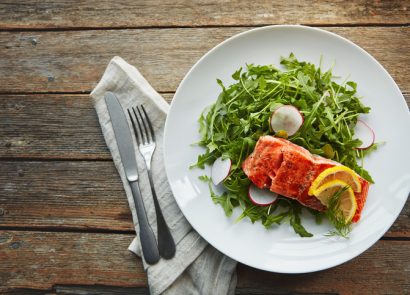-
- 1. Drop the dry eyes “Get into the habit of using lubricating drops,” says Ali Mearza, consultant ophthalmic surgeon and clinical director at Imperial College NHS Healthcare Trust (oclvision.com) “Looking at screens for long periods, central heating and air-conditioning all contribute to dry eyes. Keeping well hydrated is also important, as this ensures that the tears you produce are of good quality and keeps your eyes well lubricated.”
-
- 2. Up your oily fish The EPA and DHA Omega 3s found in oily fish such as mackerel, sardines and salmon are a soothing sight tonic. “With up to 50 percent of the photoreceptor tissue in the retina of human eyes comprised of DHA, they need adequate levels to function properly,” says registered dietitian and nutritionist, Gretchen Vannice. “Both EPA and DHA are important for the normal production of healthy eye tear film and have been shown to reduce inflammation in this area.”
-
- 3. Keep fit While you might work out to lose a few pounds or to tone up, regular exercise is also good for your eyesight. “Recent studies suggest that, by performing light exercise three or four times a week, you can reduce your chances of developing macular degeneration by 70 percent,” says award-winning optometrist Sona Thakerar. “Exercise can also decrease your chance of developing diabetes, which can lead to blood vessel damage in the retina.”
-
- 4. Get back to your roots Get back to your roots If you thought the idea of eating carrots to help you see in the dark was just a story, think again! “Carrots are well-known to be good for eye health because they contain vitamin A and beta carotene,” says Ali. “These nutrients help keep the surface of the eye healthy and can prevent eye infections and other serious eye conditions. In addition, they’re an essential component for the retinal photoreceptors, which help us see in the dark.”
-
- 5. Take a new view on relaxation Just like the rest of your muscles, your eyes need a good break now and again. This is particularly true if you do a visually taxing job that involves a lot of eye strain, such as computer work. It’s recommended you take a break from screens every 20 minutes and blink lots of times to moisturise the eyes. “Massage over-worked eyes with a hot compress to the eyelids,” says Sona. “This will help restore your eyes’ natural oil levels and relax the eye muscles. Beeswax candles also act as natural indoor air filters by releasing negative ions into the air, which bind with toxins and help remove them.”
-
- 6. Go green Go green Leafy green veg such as spinach and kale contain a crucial component for healthy eyes – lutein, sometimes known as the eye vitamin. “Both are rich in lutein, an oil-based plant nutrient, which has been shown to reduce damage to the macula [which provides the sharp, central vision we need for reading, driving and seeing fine detail] as a result of exposure to digital screens,” says Gretchen, who is head of global nutrition education at Wiley’s Finest (wileysfinest. com), which has recently launched a Bold Vision supplement specifically formulated for eye health (£27.99, planetorganic.com). “Consuming more lutein is also associated with a reduced risk of macular degeneration, better night vision, less eye fatigue, plus a better adaptability to change in light and glare.”
-
- 7. Get protected While we might associate the summer holidays with shades, the latest research now suggests we should be wearing sunglasses all year round to protect our eyes. “Too much UV exposure can increase your chances of developing cataracts, so be sure to wear sunglasses whenever you are outside and the sun is shining. If you wear glasses on a regular basis, it’s beneficial to invest in transition lenses so that your eyes are always protected,” says Amy Morris, nutritionist at water-for-health.co.uk. “Choose a pair that blocks 99-100 percent of both UVA and UVB rays.”
-
- 8. Keep clean Good hygiene is extremely important when you’re handling contact lenses or wiping off make-up. “Consistent blocking of lid margins with eye make-up can lead to irregularities and infections. By cleaning the external eyelids and eye lashes with medicated wipes, you can avoid a build up of debris,” says Sona.
-
- 9. Boost your zinc “A diet high in antioxidant-rich foods can increase your body’s ability to scavenge free radicals and neutralise their damaging effects. Seafood, black-eyed peas, eggs and tofu, in particular, are packed with zinc, which can help the body absorb vitamin A, protecting against macular degeneration and night blindness,” says nutritional therapist Mary Van Der Westhuizen (maryvdw.com). “Some studies have revealed that taking zinc, along with various other antioxidants (beta carotene, vitamin C, vitamin E, and copper), could lower the risk of developing advanced age-related macular degeneration by around 25 percent.”
- 10. Go for regular tests “Eye tests exist for a reason, so don’t ignore any overdue notices!” says Amy. “Not only are they important to assess whether you need glasses, or if your prescription has changed, they can also catch signs of anything more serious. The earlier you detect new changes, the better your chance of treatment and recovery.”


















